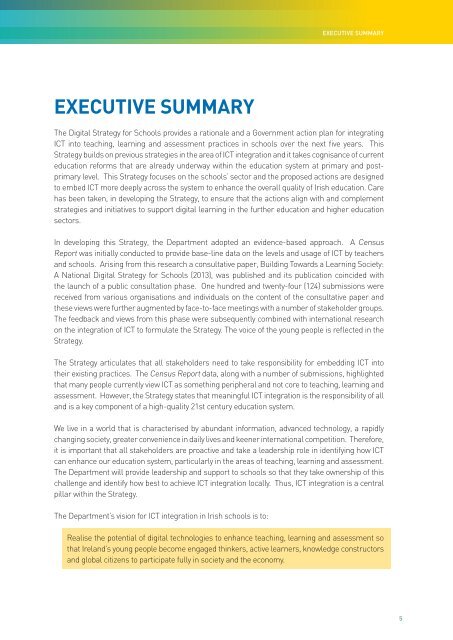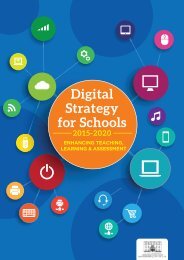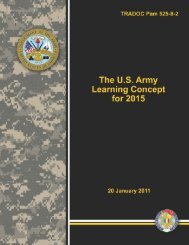Digital Strategy for Schools
TKmef
TKmef
Create successful ePaper yourself
Turn your PDF publications into a flip-book with our unique Google optimized e-Paper software.
EXECUTIVE SUMMARY<br />
EXECUTIVE SUMMARY<br />
The <strong>Digital</strong> <strong>Strategy</strong> <strong>for</strong> <strong>Schools</strong> provides a rationale and a Government action plan <strong>for</strong> integrating<br />
ICT into teaching, learning and assessment practices in schools over the next five years. This<br />
<strong>Strategy</strong> builds on previous strategies in the area of ICT integration and it takes cognisance of current<br />
education re<strong>for</strong>ms that are already underway within the education system at primary and postprimary<br />
level. This <strong>Strategy</strong> focuses on the schools’ sector and the proposed actions are designed<br />
to embed ICT more deeply across the system to enhance the overall quality of Irish education. Care<br />
has been taken, in developing the <strong>Strategy</strong>, to ensure that the actions align with and complement<br />
strategies and initiatives to support digital learning in the further education and higher education<br />
sectors.<br />
In developing this <strong>Strategy</strong>, the Department adopted an evidence-based approach. A Census<br />
Report was initially conducted to provide base-line data on the levels and usage of ICT by teachers<br />
and schools. Arising from this research a consultative paper, Building Towards a Learning Society:<br />
A National <strong>Digital</strong> <strong>Strategy</strong> <strong>for</strong> <strong>Schools</strong> (2013), was published and its publication coincided with<br />
the launch of a public consultation phase. One hundred and twenty-four (124) submissions were<br />
received from various organisations and individuals on the content of the consultative paper and<br />
these views were further augmented by face-to-face meetings with a number of stakeholder groups.<br />
The feedback and views from this phase were subsequently combined with international research<br />
on the integration of ICT to <strong>for</strong>mulate the <strong>Strategy</strong>. The voice of the young people is reflected in the<br />
<strong>Strategy</strong>.<br />
The <strong>Strategy</strong> articulates that all stakeholders need to take responsibility <strong>for</strong> embedding ICT into<br />
their existing practices. The Census Report data, along with a number of submissions, highlighted<br />
that many people currently view ICT as something peripheral and not core to teaching, learning and<br />
assessment. However, the <strong>Strategy</strong> states that meaningful ICT integration is the responsibility of all<br />
and is a key component of a high-quality 21st century education system.<br />
We live in a world that is characterised by abundant in<strong>for</strong>mation, advanced technology, a rapidly<br />
changing society, greater convenience in daily lives and keener international competition. There<strong>for</strong>e,<br />
it is important that all stakeholders are proactive and take a leadership role in identifying how ICT<br />
can enhance our education system, particularly in the areas of teaching, learning and assessment.<br />
The Department will provide leadership and support to schools so that they take ownership of this<br />
challenge and identify how best to achieve ICT integration locally. Thus, ICT integration is a central<br />
pillar within the <strong>Strategy</strong>.<br />
The Department’s vision <strong>for</strong> ICT integration in Irish schools is to:<br />
Realise the potential of digital technologies to enhance teaching, learning and assessment so<br />
that Ireland’s young people become engaged thinkers, active learners, knowledge constructors<br />
and global citizens to participate fully in society and the economy.<br />
5




